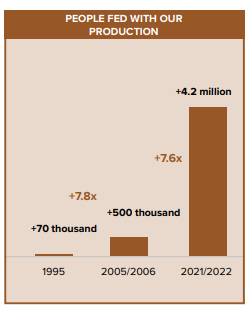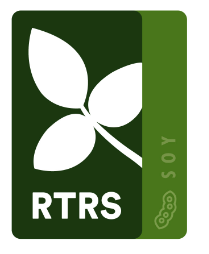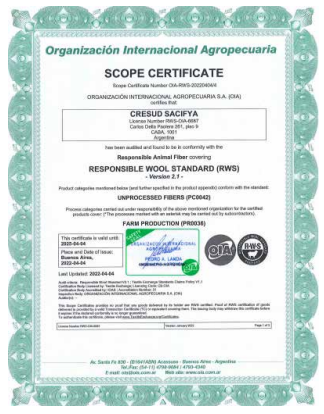


Our vision of feeding the world, following new trends and changes in consumption habits, drives us to continue diversifying our production, combining the traditional commodities business with specialty and more advanced products in the value chain.
“I imagine Cresud as a world food provider. With a growing population and an ever-increasing food demand, using the blessing of this region professionally is our responsibility” Eduardo S. Elsztain (Chairman)

Estimated according to the regional grain and meat production, its calories and the food need of a person of average weight (80 kg).

AGRICULTURAL PRODUCT CERTIFICATIONS
We have several certifications for agricultural products:
2BSvs PROGRAM (Biomass Biofuels Sustainability voluntary scheme): The 2BSvs certification is a French scheme, applicable in the European Union, aimed at sustainable production of biomass. It is relevant to producers, in which sustainability criteria are established for use in biofuels.

RTRS (ROUND TABLE ON RESPONSIBLE SOY): The RTRS Standard for Responsible Soy Production is a holistic certification scheme, consisting of five principles and 108 progressive and mandatory compliance indicators:
La Compañía certifico 4.157 hectáreas de producción de soja correspondientes a la campaña 2022/23 por un período de 5 años y con auditorías anuales obligatorias para el establecimiento El Tigre, ubicado en la localidad de Trenel, La Pampa, Argentina.
Esta certificación, de renombre en el sector agrícola y altamente valorada por el mercado internacional, reconoce el compromiso de la compañía en el cumplimiento de las leyes y buenas prácticas empresariales, la provisión de buenas condiciones laborales, el respeto y relación con las comunidades locales, el cuidado del medio ambiente y la producción bajo prácticas agrícolas adecuadas.
Seguimos avanzando en la estrategia ESG, aplicando las mejores prácticas agropecuarias a través del uso responsable de los recursos naturales y la tecnología, con la misión de producir alimentos de calidad para una población mundial creciente, con responsabilidad social, equipos diversos comprometidos y elevados estándares de gobierno corporativo.

RWS (RESPONSIBLE WOOL STANDARD): Our 8 de Julio farm, located in Santa Cruz province, received RWS certification for good shearing practices in April 2022. Responsible Wool Standard is a voluntary global standard, which addresses the welfare of sheep and land management practices, providing key differentiation and full traceability of wool. The International Agricultural Organization (OIA), a leading certification company, audits each stage of the supply chain, to ensure that all program requirements are met. The objectives are:
Products may contain 100% certified wool or blends, ranging from 5% to 99% certified wool. Only products containing 100% certified wool can be labeled with the RWS logo. The advantages are protection of animal welfare, preservation of soil health and traceability of the supply chain.
PROTERRA PROGRAM: The ProTerra Standard is based on the Basel Criteria for Responsible Soy Production, published in 2004. It has four basic objectives:
The ProTerra product packaging seal is a means by which brands can directly communicate their commitment to sustainability and non-GMO use to consumers and stakeholders. The ProTerra seal assures consumers that the product was produced in a sustainable and traceable manner and meets NON-GMO requirements. During the 21/22 season, we produced 27,500 hectares of non-GMO crops in Argentina, representing approximately 24% of our production. We are working to certify NON-GMO soybean with the ProTerra standard in the 22/23 season.

OUR CUSTOMERS AND SUPPLIERS
CUSTOMERS
During fiscal year 2022, our agricultural sales (excluding farm sales) reached approximately 30 customers. Sales to our ten largest customers represented approximately 55% to 60% of our net sales. Some of these customers were Cargill, FASA, Bunge Alimentos S/A, ACA, GLENCORE and QUILMES. We signed non-binding letters of intent with some of our main customers, which allow us to estimate the volume of demand for specific products and plan production accordingly. In general, we enter into short-term contracts with a term of less than one year.
MARKETING CHANNELS AND SALES METHODS
Grain: We normally use grain brokers and other intermediaries to trade on the exchanges. We sell a portion of our production in advance through forward contracts and put and call options to hedge against a decline in prices. Approximately 87% of our futures contracts and options are traded on the Buenos Aires Forward Market and 13% on the Chicago Board of Trade as hedges.
Livestock production: The marketing channels are varied. We sell directly to meat processing plants and local supermarkets, fairs and auctions. Among our customers are Sociedad Anónima Carnes Pampeanas S.A., Frigorífico Bermejo, Cresud Sociedad Anónima, Comercial, Inmobiliaria, Financiera y Agropecuaria Memoria Ejercicio 2022 5 Arre Beef S.A., Saenz Valiente Bulrich y Colombo y Magliano S.A., at prices based on the Agricultural Livestock Market price. We usually take care of the freight to the market and occasionally a commission is paid for the operations.
INPUTS
The current direct cost of our grain production varies from crop to crop and normally includes the following costs: tillage, seeds and agricultural inputs. We purchase in bulk and store seeds and agricultural inputs to take advantage of off-season discounts.
SUPPLIERS
Our suppliers of goods and services can be small regional companies as well as multinational companies; 100% are of national origin.
The relationship between the Company and its suppliers is in accordance with market conditions: the best purchasing or contracting alternatives allow the comparison of different proposals, as long as they meet the expected service and/or technical requirements, both in the case of goods and services. All suppliers and contractors must comply with labor, health and safety regulations, technical regulations, and environmental qualifications and practices applicable to their activity.
In order to provide services, they must present the documents indicating their compliance and are periodically audited for occupational safety. On a monthly basis, they are audited for compliance with legal social security requirements for large contractors (e.g., cleaning, security, and construction).
